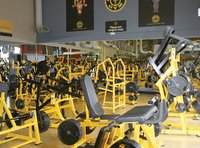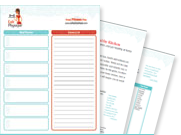After all of your hard work and effort, wouldn’t it stink if little things you never thought of were impeding your progress? Check out these common fitness mistakes to make sure that you’re not unconsciously sabotaging your healthy lifestyle:
1. Not asking enough questions. This is the first place you should start if you are looking into joining a fitness facility or working with exercise professionals. Always check the credentials of your trainers, class instructors, etc. Be sure that any available nutrition information is provided by a registered dietitian. Inquire about educational background, years of experience, and ask to meet anyone that you may be working with. Aside from making sure that everyone is professionally qualified, it is important to make sure that your personalities are compatible. It is also a good idea to ask the health club’s representative about payment options, cancellation policies, whether it is possible to freeze your membership for an extended period of time, etc.

2. Trying to do too much, too soon. We are often very motivated when we begin an exercise routine, and sometimes that can lead to starting out too fast and doing too much too quickly. Individuals who do this are more likely to burn out and give up on exercise altogether.
 3. Setting unrealistic expectations. No matter what the fitness magazines promise, you are not likely to have a “bikini body” in one month, especially if you are significantly overweight and out-of-shape to begin with. Nor will you be transformed from couch potato to marathon runner in such a short stretch of time. However, with patience and dedication, you will become leaner, healthier, and more fit.
3. Setting unrealistic expectations. No matter what the fitness magazines promise, you are not likely to have a “bikini body” in one month, especially if you are significantly overweight and out-of-shape to begin with. Nor will you be transformed from couch potato to marathon runner in such a short stretch of time. However, with patience and dedication, you will become leaner, healthier, and more fit.
4. Performing strength training exercises improperly. If you are new to strength training, ask an attendant or a trainer to show you how to use the weight machines and what the proper form is for free weights and weight machines. (A session with a trainer is also a good idea if you need a refresher or if you are ready to increase the intensity of your strength training.)
5. Using cardiovascular machines improperly. Make any necessary adjustments to the cardio machine before you get on. Don’t be afraid to ask questions about using a new cardio machine or any of its preprogrammed workouts. And don’t lean on the machine! Leaning decreases the effectiveness and the calorie burn of your workout. If you can’t stand up straight while using the treadmill, StairMaster, or elliptical trainer, then you need to decrease the speed and/or the resistance level.
6. Not taking enough time to warm up or cool down. Don’t skimp on warming up, cooling down, or stretching; otherwise, you risk stressing your heart and injuring your joints and muscles. For best results, warm up for 5-10 minutes (the longer your planned workout, the longer your warm up should be), then stretch for about 10 minutes before your workout. To cool down, gradually decrease your speed and intensity. The cool down should be similar to the warm up, only in reverse. Finish your workout with another 10-15 minutes of stretching, with particular emphasis on muscles that you used heavily during your workout.
7. Not wearing appropriate attire. You don’t need to wear the latest (or most expensive) workout gear featured in your favorite fitness magazine, but you do need comfortable clothing and supportive shoes.
 8. Consuming “sports drinks” and energy bars unnecessarily. Most recreational exercisers do not need “energy” bars or “energy” drinks. A sports drink is only necessary for a workout that lasts 60-90 minutes or more. For a moderate workout that lasts for less than an hour, water is enough. However, do drink plenty of water. Have at least two cups of water before your workout, plus another four to six ounces of water every 15 minutes during your workout. Remember—by the time you begin feeling thirst, you have already become mildly dehydrated!
8. Consuming “sports drinks” and energy bars unnecessarily. Most recreational exercisers do not need “energy” bars or “energy” drinks. A sports drink is only necessary for a workout that lasts 60-90 minutes or more. For a moderate workout that lasts for less than an hour, water is enough. However, do drink plenty of water. Have at least two cups of water before your workout, plus another four to six ounces of water every 15 minutes during your workout. Remember—by the time you begin feeling thirst, you have already become mildly dehydrated!
9. Trying to push through an injury. A dull muscle ache after a workout is normal, for beginning exercisers and veterans alike. This soreness (called delayed onset muscle soreness, or DOMS) is caused by tiny tears in the muscle. It’s the process of healing these tears that causes muscle tissue to grow and become stronger. However, sharp pain during a workout is not normal. Do not try to “work through” the pain, and if the pain is severe or unusual, don’t hesitate to visit your physician.
10. Saying stuck in a routine. If you never alter the amount or the intensity of the exercise you get, you are likely to end up on a plateau. To better understand how your muscles adapt to exercise, consider the effort it takes to lift a gallon of milk out of the fridge. If your body couldn’t adapt to the demand of lifting that gallon jug, then your arm would ache every time you poured a glass of milk! For best results, shake up your workout at least once a month.
All of these great tips came from Jennifer May, M.S., R.D., M.S. She’s the Manager of Nutrition Services for DietWatch.com.
About Cafe Physique:
The mission of Café Physique is to help clients reach and exceed their personal fitness and nutrition goals. If you’re in need of an a nutritionist in Atlanta or an Atlanta personal trainer – Café Physique is the perfect solution. We offer Atlanta yoga instruction, Atlanta prenatal workouts, and Atlanta personal training. We also have private sessions of pilates that Atlanta residents are raving about. We invite you to let a member of our Atlanta registered dietitian staff or personal training team develop and implement a realistic and healthy lifestyle plan to meet your personal goals.

